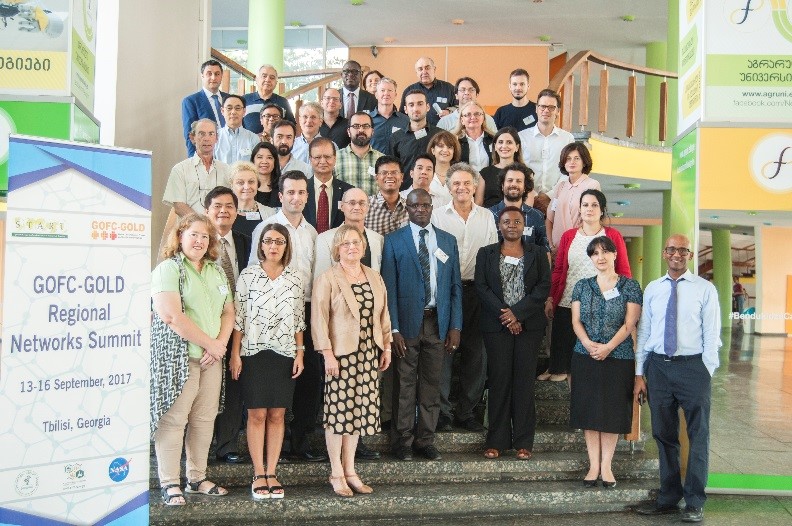The Global Observation of Forest and Land Cover Dynamics (GOFC-GOLD) Regional Networks Summit was held during 13–15th September, 2017 in Tbilisi, Georgia. The invitational Summit was organized in collaboration with the Agricultural University of Georgia, Tbilisi, Georgia. Forty six participants from sixteen different countries attending the summit. During the event, participants also celebrated the 20th anniversary of the GOFC-GOLD program. Two faculty members from the Department of Geographical Sciences, Prof. Chris Justice and Dr. Krishna Vadrevu (Adjunct faculty) attended the regional summit.
The main goal of GOFC/GOLD program is to provide a forum for observation and data coordination, information exchange and a framework for establishing the necessary long-term monitoring systems. The GOFC/GOLD themes on land cover and fire monitoring themes are aimed at refining and articulating the international observation requirements and making the best possible use of land and fire products from the existing and future satellite observing systems, for fire management, policy decision-making and global change research. GOFC/GOLD is pursuing, in a joint effort with the Committee on Earth Observing Satellites (CEOS) Working Group on Calibration and Validation (WGCV) Land Product Validation (LPV) subgroup, the coordinated validation of land and fire products by standardized protocols.
The Department of Geographical Sciences has been closely involved with the program since its inception in 1997. John Townshend served as the Chair of the program for many years, Chris Justice served until recently as the Co-Chair of the Fire Implementation Team which includes Research Faculty Members Louis Giglio, Wilfrid Schroeder and Evan Ellicott. Matt Hansen is a member of the Land Cover Implementation Team.
GOFC/GOLD has been promoting a self-organized regional networks of data users, data brokers and providers, where closer linkages and collaborations are established with emphasis on an improved understanding of user requirements and product quality.
GOFC-GOLD Regional Networks enable data providers, scientists and operational users to articulate information requirements and improve their access to and use of Earth observations. These Networks enable calibration, validation and improvement of methods and algorithms and integration of in-situ and remote sensing observations; are a common arena for users and researchers operating in a specific geographic area; and offer a mechanism for sharing of resources and expertise. They represent a link between national agencies, user groups and the global user/producer community, and NASA LCLUC scientists.
The 2017 GOFC-GOLD Regional Networks Summit in Tbilisi, Georgia assessed the past performance of regional networks and discussed their future direction. The network summit also served as an opportunity for cross-network learning and knowledge sharing. The meeting was attended by regional network members, GOFC-GOLD Executive Committee members and other partners. The Summit was preceded by a 2-day kickoff event (Sep 11-12) for the Caucuses Network, a new addition to existing GOFC-GOLD networks in the region. Some of the important conclusions of the GOFC summit are highlighted below:
- Continue strengthening collaborative research projects between the US and regional networks scientists on land use/cover change, fire, biomass and REDD+ themes. Extend beyond these themes to reach broader audience in different countries.
- Strengthen capacity building and training activities of regional networks and connecting them to other international programs such as GFOI, GEOGLAM, Future Earth, USGS Silvacarbon, NASA SERVIR, etc.
- Use regional network expertise for calibration and validation of satellite remote sensing products.
- Develop methodology guidelines on LCLUC, Fires, REDD+ and Biomass themes using satellite remote sensing data to reach broader audience.
- Enhance satellite product use and access to regional network researchers by developing remote sensing products and making these available over the Internet.
- Encourage cross-regional network exchanges for effective sharing of data.
- Pursue international funding opportunities to strengthen GOFC-regional networks for continued sustainability.


